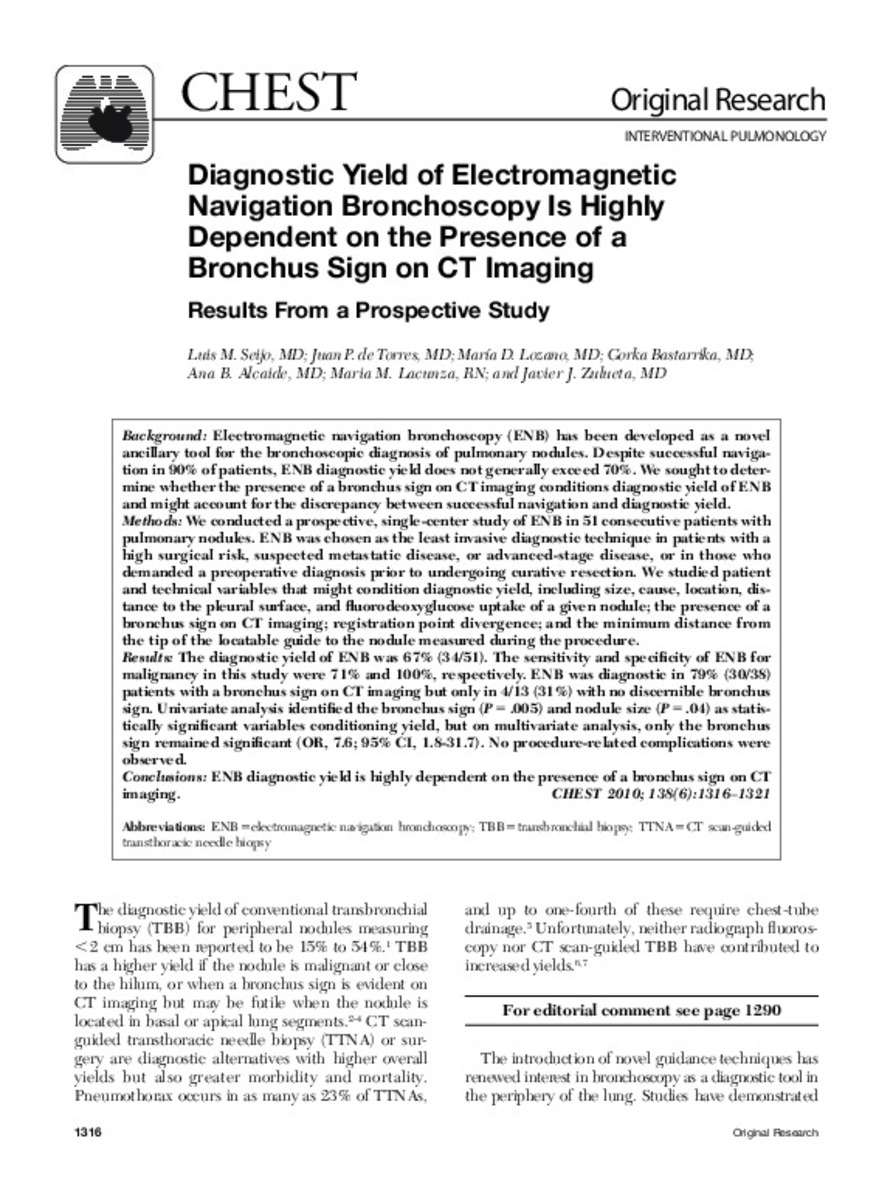Full metadata record
| DC Field | Value | Language |
|---|---|---|
| dc.creator | Seijo, L. (Luis) | - |
| dc.creator | Torres, J.P. (Juan P.) de | - |
| dc.creator | Lozano, M.D. (María Dolores) | - |
| dc.creator | Bastarrika, G. (Gorka) | - |
| dc.creator | Alcaide, A.B. (Ana Belén) | - |
| dc.creator | Lacunza, M.M. (María M.) | - |
| dc.creator | Zulueta, J. (Javier) | - |
| dc.date.accessioned | 2012-07-19T12:32:54Z | - |
| dc.date.available | 2012-07-19T12:32:54Z | - |
| dc.date.issued | 2010 | - |
| dc.identifier.citation | Seijo LM, de Torres JP, Lozano MD, Bastarrika G, Alcaide AB, Lacunza MM, et al. Diagnostic yield of electromagnetic navigation bronchoscopy is highly dependent on the presence of a Bronchus sign on CT imaging: results from a prospective study. Chest 2010 Dec;138(6):1316-1321. | es_ES |
| dc.identifier.issn | 0012-3692 | - |
| dc.identifier.uri | https://hdl.handle.net/10171/22930 | - |
| dc.description.abstract | Electromagnetic navigation bronchoscopy (ENB) has been developed as a novel ancillary tool for the bronchoscopic diagnosis of pulmonary nodules. Despite successful navigation in 90% of patients, ENB diagnostic yield does not generally exceed 70%. We sought to determine whether the presence of a bronchus sign on CT imaging conditions diagnostic yield of ENB and might account for the discrepancy between successful navigation and diagnostic yield. METHODS: We conducted a prospective, single-center study of ENB in 51 consecutive patients with pulmonary nodules. ENB was chosen as the least invasive diagnostic technique in patients with a high surgical risk, suspected metastatic disease, or advanced-stage disease, or in those who demanded a preoperative diagnosis prior to undergoing curative resection. We studied patient and technical variables that might condition diagnostic yield, including size, cause, location, distance to the pleural surface, and fluorodeoxyglucose uptake of a given nodule; the presence of a bronchus sign on CT imaging; registration point divergence; and the minimum distance from the tip of the locatable guide to the nodule measured during the procedure. RESULTS: The diagnostic yield of ENB was 67% (34/51). The sensitivity and specificity of ENB for malignancy in this study were 71% and 100%, respectively. ENB was diagnostic in 79% (30/38) patients with a bronchus sign on CT imaging but only in 4/13 (31%) with no discernible bronchus sign. Univariate analysis identified the bronchus sign (P = .005) and nodule size (P = .04) as statistically significant variables conditioning yield, but on multivariate analysis, only the bronchus sign remained significant (OR, 7.6; 95% CI, 1.8-31.7). No procedure-related complications were observed. CONCLUSIONS: ENB diagnostic yield is highly dependent on the presence of a bronchus sign on CT imaging. | es_ES |
| dc.language.iso | eng | es_ES |
| dc.publisher | American College of Chest Physicians | es_ES |
| dc.rights | info:eu-repo/semantics/openAccess | es_ES |
| dc.subject | Carcinoma, non-small-cell lung/diagnosis/radiography | es_ES |
| dc.subject | Carcinoma, squamous cell/diagnosis/radiography | es_ES |
| dc.subject | Bronchi/pathology | es_ES |
| dc.title | Diagnostic yield of electromagnetic navigation bronchoscopy is highly dependent on the presence of a Bronchus sign on CT imaging: results from a prospective study | es_ES |
| dc.type | info:eu-repo/semantics/article | es_ES |
| dc.relation.publisherversion | http://journal.publications.chestnet.org/article.aspx?articleid=1087661 | es_ES |
| dc.type.driver | info:eu-repo/semantics/article | es_ES |
Files in This Item:
Statistics and impact
Items in Dadun are protected by copyright, with all rights reserved, unless otherwise indicated.






